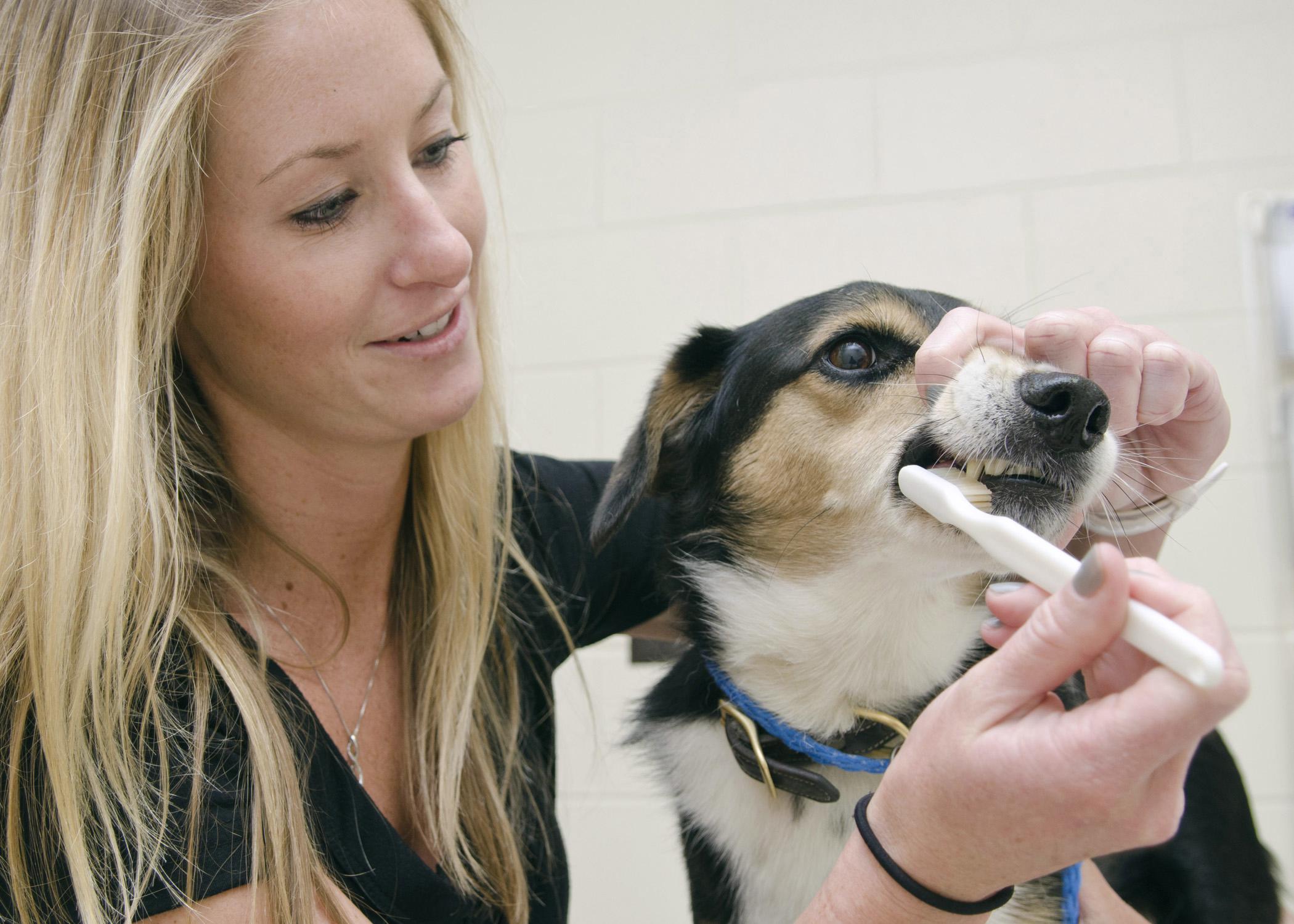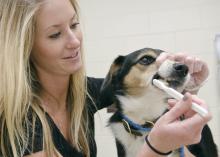Information Possibly Outdated
The information presented on this page was originally released on August 9, 2012. It may not be outdated, but please search our site for more current information. If you plan to quote or reference this information in a publication, please check with the Extension specialist or author before proceeding.
Proper oral care in pets prevents big problems
JACKSON – A pet’s bad breath is not just offensive; it could be a sign the animal has periodontal disease.
“By the age of 3 years, up to 80 percent of dogs and cats have some degree of periodontal disease if regular home care has not been done,” said Dr. Diana Eubanks, associate clinical professor at Mississippi State University’s College of Veterinary Medicine.
Periodontal disease is an infection of the gums caused by the buildup of plaque and bacteria under the gumline. Adult dogs and cats are diagnosed with the disease more frequently than any other condition. Without treatment, the tooth’s supporting tissues become severely infected, leading to tooth, bone and soft tissue loss. Severe cases of periodontal disease can cause bacteria to enter the bloodstream and have been associated with heart, kidney and liver damage in dogs, according to the American Veterinary Dental College.
“Chews, dental diets and sprays can help reduce plaque, but they cannot prevent periodontal disease,” said Eubanks, who is also a member of the Academy of Veterinary Dentistry. “Tooth-brushing with a veterinary toothpaste remains the gold standard.”
Using the right tools helps ensure the best possible results and avoids injury.
“An appropriately sized, soft-bristled brush is best,” Eubanks said. “The smaller the animal, the smaller the toothbrush should be. Human toothbrushes or pet toothbrushes can be used, but be sure the toothpaste is specifically formulated for pets. Toothpaste for humans should not be swallowed and can be harmful to pets.”
Brushes that fit on the end of the finger do not remove plaque very efficiently, but they do help get an animal accustomed to having its teeth brushed, Eubanks said. Daily brushing is ideal, but three times per week is acceptable. Chewing can supplement brushing by reducing plaque, but hard chews can cause broken teeth.
In addition to home care, regular professional cleanings are essential.
“Every pet is different, and how often a pet should have its teeth cleaned depends on several factors,” said Dr. Billy Scott, who owns and operates The Family Vet and the recently opened Family Pet Dentistry in Ridgeland. “The size of the breed, the pet’s age and its history of dental care all have to be taken into consideration. In general, I recommend a routine cleaning at least once a year.”
Scott said cleanings should start when a pet is 2 to 3 years old.
“I don’t like to wait until there is a problem,” he said. “When exams start early, we have the chance to prevent problems.”
Problems can go unnoticed unless pets get comprehensive oral exams.
“By nature, pets do not often show pain, so there are problems neither owners nor veterinarians can catch unless proper oral examinations are done,” he said. “I’ve had people come in who thought their pets were suffering from old age and were at the end of their lives. When I examined the pet’s mouth, I discovered periodontal disease. We treated it, and the owners were amazed at how the animal’s behavior changed for the better.”
Scott said comprehensive dental exams and cleanings should be done while the pet is under anesthesia. Most patients are able to return home the same day.
Veterinarians are able to perform a dental prophylaxis, or cleaning, but dental work is not always a simple procedure, Eubanks said.
“More in-depth procedures, such as extractions and root canals, should only be done by someone having both experience and the proper equipment,” she said. “Many veterinarians in private practices are very capable of performing these procedures. Others may refer the more complicated cases to someone with special training or special equipment, such as dental X-ray equipment.”
Eubanks said pet owners should consult their veterinarians to learn more about veterinary dental care and effective, safe home care products.


